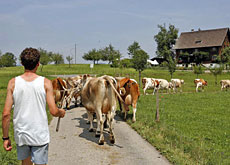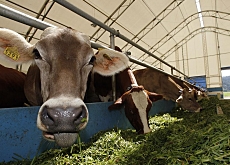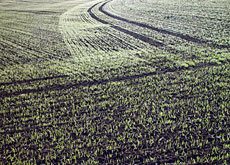Think tank urges radical agriculture reform

A leading think tank has called for the abolition of duties and tariffs and direct subsidies as part of a shake-up of the Swiss farming sector.
The study by Avenir Suisse comes ahead of a debate in parliament next month on the country’s agricultural policy.
The report published on Thursday says trade barriers and financial measures by the state to support the country’s farmers should be dropped within 15 years.
It calls for farmers to develop more entrepreneurial initiative while the state provides only the basic framework.
The liberalised policy would lead to cheaper prices for agricultural products and would allow a more targeted use of state funds for the agriculture and the environment.
The authors of the report are calling for a free-trade accord on agriculture with the European Union and a reform of regulations on the lease and sale of land in a bid to increase the competitive edge of Swiss farmers.
Over the past 15 years around a third of the country’s farms have closed down and the number of employees working in the agriculture sector has dropped by a quarter to 188,000, according to the Federal Agriculture Office.
The Swiss Farmers Association reacted negatively to the study, bemoaning the lack of new and useable solutions and accusing Avenir Suisse of “text-book liberal thinking”.
The association said the think tank had failed to come up with suggestions that would incorporate the entire agricultural sector.
Parliament
In December the Senate is due to begin debating government proposals for agricultural reforms, including some cuts in market support measures.
Avenir Suisse, which is close to the business community, dismissed allegations that the publication of the latest study is timed to influence the parliamentary debate.
It claimed the aim is to launch an in-depth discussion of the country’s policy on agriculture.
Earlier this year the Farmers Association warned that revenues in the sector would drop if prices continued to fall and markets became more open to foreign competition.
It added that farmers were prepared to adapt to new conditions with political support.
The leading political parties are divided over the government’s reform plans on agriculture.
swissinfo with agencies

More
Avenir Suisse
In 1900, 31% of the Swiss workforce was employed in the agricultural sector. Today the figure is slightly less than 4%. But these 4% cultivate, use, shape and tend almost 40% of the total area of the country.
The farming community has become a small minority in a service economy, with a clear multifunctional role, which has been enshrined in the Federal Constitution since 1996.
At the centre of Swiss agricultural law is the requirement that state support for agriculture should now primarily take the form of direct payments and payments for environmentally-friendly farming rather than being product-related.
Between 2003 and 2007, the government will spend SFr14.09 billion ($11.5 billion) on supporting agriculture. The percentage of agricultural spending has fallen from 8.5 per cent of the government’s total budget in 1990 to 7.1 per cent in 2006.
The reform plans for 2011 are aimed at improving the competitiveness of Switzerland’s agricultural sector.
The main thrust is to make direct payments to farmers instead of giving market support.
Cabinet wants to pay subsidies of SFr13.4 billion from 2008 to 2011, which is SFr638 million less than for the current four-year period.

In compliance with the JTI standards
More: SWI swissinfo.ch certified by the Journalism Trust Initiative



You can find an overview of ongoing debates with our journalists here. Please join us!
If you want to start a conversation about a topic raised in this article or want to report factual errors, email us at english@swissinfo.ch.